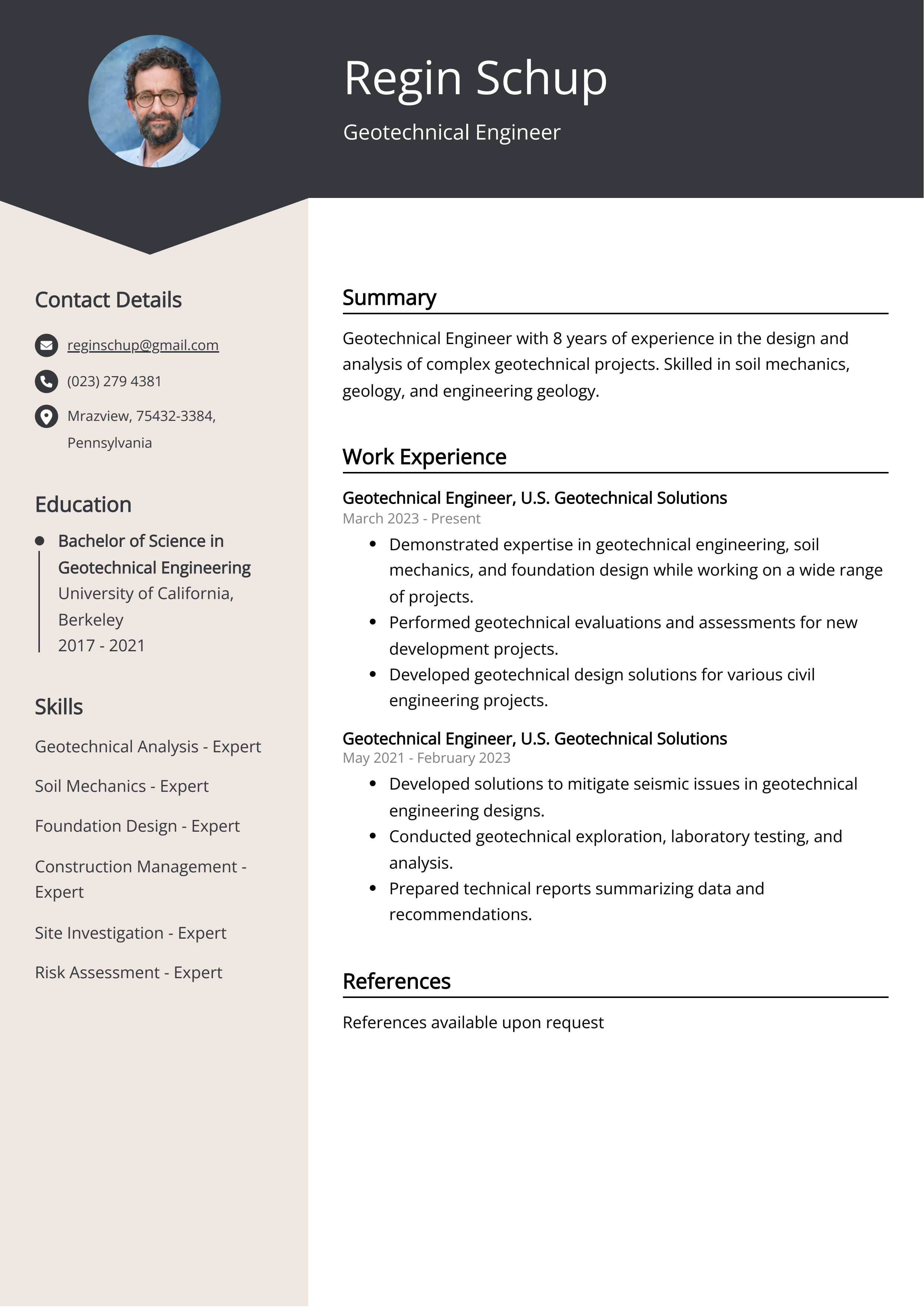The Greatest Guide To Geotheta
The Greatest Guide To Geotheta
Blog Article
The Greatest Guide To Geotheta
Table of ContentsThe Ultimate Guide To Geotheta8 Simple Techniques For GeothetaThe Buzz on GeothetaThe Facts About Geotheta RevealedThe 8-Second Trick For Geotheta

They conduct website examinations, collect samples, do laboratory tests, and analyze information to review the viability of the ground for building and construction jobs - Geo Tech Engineer. Based on their findings, geotechnical designers supply referrals for foundation design, slope stability, keeping structures, and mitigation of geotechnical dangers. They collaborate with various other professionals, such as architects, architectural designers, and building and construction groups, to make sure that geotechnical considerations are integrated right into the overall task layout and application
By analyzing the habits and buildings of soil and rock, they can recognize possible geotechnical dangers such as landslides, soil negotiation, or slope instability. Their experience assists stop failings or accidents that might threaten lives and home. Here are some in-depth responsibilities and responsibilities of a geotechnical engineer: Website Examination: Geotechnical designers conduct website investigations to gather data on subsurface problems.
They analyze the information to comprehend the homes and habits of the dirt and rock, including their strength, permeability, compaction attributes, and groundwater conditions. Geotechnical Analysis and Style: Geotechnical designers evaluate the data accumulated during website investigations to examine the stability and suitability of the site for building and construction jobs. They execute geotechnical computations and modeling to assess aspects such as bearing capability, settlement, incline security, lateral planet pressures, and groundwater flow.
What Does Geotheta Do?
Structure Style: Geotechnical engineers play an important role in designing foundations that can securely sustain the desired framework. They examine the dirt problems and tons requirements to figure out the proper structure kind, such as superficial foundations (e.g., footings), deep foundations (e.g (https://www.huntingnet.com/forum/members/geotheta.html)., heaps), or specialized strategies like dirt enhancement. They consider variables such as settlement restrictions, birthing capacity, and soil-structure interaction to establish optimal structure designs
They review building strategies, screen website activities, and carry out area examinations to confirm that the design referrals are complied with. If unpredicted geotechnical concerns develop, they evaluate the scenario and provide suggestions for remediation or changes to the layout. Danger Evaluation and Mitigation: Geotechnical engineers evaluate geotechnical hazards and threats connected with the project website, such as landslides, liquefaction, or dirt disintegration.

Collaboration and Communication: Geotechnical engineers work closely with other experts associated with a project, such as designers, architectural engineers, and building and construction teams. Efficient interaction and collaboration are vital to incorporate geotechnical considerations into the total task style and building process. Geotechnical designers supply technical proficiency, response inquiries, and guarantee that geotechnical needs are satisfied.
Get This Report on Geotheta
Below are some kinds of geotechnical designers: Foundation Engineer: Structure designers concentrate on developing and assessing structures for frameworks. They evaluate the dirt conditions, load needs, and site characteristics to establish the most suitable structure kind and design, such as shallow foundations, deep foundations, or specialized methods like heap foundations.
They assess the aspects affecting incline security, such as dirt residential or commercial properties, groundwater problems, and incline geometry, and create methods to stop incline failings and reduce dangers. Quake Designer: Quake designers specialize in assessing and designing frameworks to hold up against seismic pressures. They analyze the seismic threat of a website, review dirt liquefaction potential, and establish seismic style standards to guarantee the safety and resilience of structures throughout quakes.
They perform field testing, accumulate examples, and assess the gathered information to define the dirt residential or commercial properties, geologic formations, and groundwater conditions at a site. Geotechnical Instrumentation Engineer: Geotechnical instrumentation designers focus on monitoring and gauging the behavior of soil, rock, and frameworks. They set up and preserve instrumentation systems that keep an eye on aspects such as dirt negotiation, groundwater degrees, incline motions, and structural variations to analyze efficiency and provide early warnings of potential concerns.
Geotheta Can Be Fun For Everyone
They perform tests such as triaxial examinations, consolidation tests, direct shear examinations, and permeability tests to gather data for geotechnical analysis and layout. Geosynthetics Engineer: Geosynthetics engineers specialize in the design and application of geosynthetic products, such as geotextiles, geogrids, and geomembranes. They use these products to enhance soil security, strengthen slopes, supply water drainage solutions, and control erosion.
They tend to be investigative people, which means they're intellectual, reflective, and curious. They are interested, systematic, rational, analytical, and rational. Some of them are additionally social, meaning they're kind, charitable, participating, patient, caring, handy, compassionate, tactful, and pleasant - Geo Tech Engineer.
In the office atmosphere, geotechnical engineers utilize specialized software devices to perform estimations, develop designs, and assess data. They prepare reports, testimonial project specs, communicate with customers and employee, and coordinate job tasks. The workplace setup supplies a favorable atmosphere for research, evaluation, and cooperation with various other professionals involved in the project.
More About Geotheta
They often visit job websites to perform site examinations, examine geotechnical problems, and collect data for evaluation. These brows through involve traveling to various places, in some cases in remote or tough terrains. Geotechnical engineers may carry out soil tasting, conduct examinations, and monitor building and construction activities to ensure that the geotechnical elements of the job are being applied appropriately.
Geotechnical designers additionally function in specialized geotechnical laboratories. Geotechnical research laboratory designers function extensively in these environments, taking care of screening equipment, running tools, and tape-recording information.
Report this page